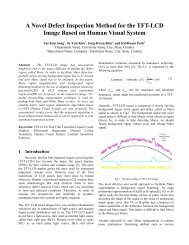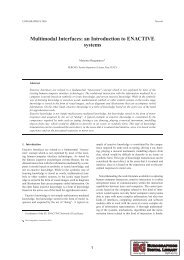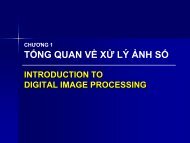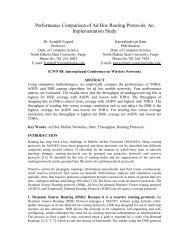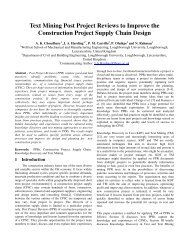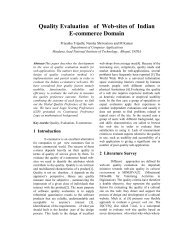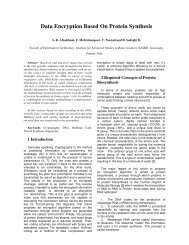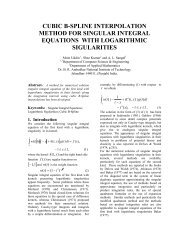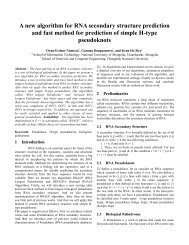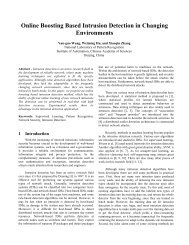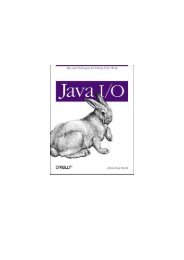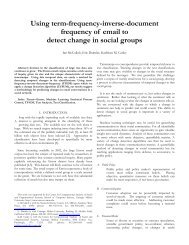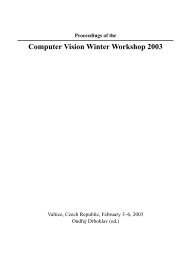O'Reilly - Java Message Service
O'Reilly - Java Message Service
O'Reilly - Java Message Service
You also want an ePaper? Increase the reach of your titles
YUMPU automatically turns print PDFs into web optimized ePapers that Google loves.
<strong>Java</strong> <strong>Message</strong> <strong>Service</strong><br />
The iBus//Mobile product uses a <strong>Java</strong> API for its client that is similar to JMS, but much<br />
lighter to accommodate smaller palm and mobile phone platforms. iBus//Mobile also<br />
supports nonprogrammable mobile devices, such as current generation pagers and cellular<br />
phones.<br />
iBus//Mobile supports several protocols, including the WAP protocol stack (notably WAP-<br />
Push, WDP, and WTLS), IrDA, Bluetooth, SMS, GPRS, TCP/IP, and HTTP. The Mobile<br />
product is specially designed to handle frequent disconnection, which is the norm in a<br />
wireless environment.<br />
The iBus//Mobile clients connect to an iBus//<strong>Message</strong>Server via a special proxy that<br />
translates between WAP and SMS (used by the clients) and the native protocol used by<br />
iBus//<strong>Message</strong>Server.<br />
9.4.4 Next Versions<br />
The next versions of the SoftWired JMS providers will support JMS 1.0.2, including the<br />
JMS XA interfaces for two-phase commit. In addition, the next versions will support<br />
hierarchical topics and clustering (<strong>Message</strong>Server). SoftWired products will be offered in<br />
Standard, Business, and Enterprise editions.<br />
9.5 Sun Microsystems: <strong>Java</strong> <strong>Message</strong> Queue<br />
Although Sun is primarily responsible for defining the JMS API, it also provides a JMS<br />
product.<br />
9.5.1 Version 1.1<br />
Version 1.1 of the <strong>Java</strong> <strong>Message</strong> Queue product is based on InterAgent, a product that was<br />
initially developed by Modulus Inc., which was later acquired by Enron Corp. InterAgent<br />
is written in C and originally had a proprietary <strong>Java</strong> API. This proprietary API was<br />
replaced with the JMS API. Sun licensed InterAgent from Enron to create the <strong>Java</strong><br />
<strong>Message</strong> Queue ( JMQ) 1.1 product.<br />
JMQ is compliant with the JMS 1.0.2 specification. The JMS clients are written in <strong>Java</strong><br />
and can be run on JDK 1.1.8 and JDK 1.2.2 Virtual Machines. The server is written in C<br />
and is supported on Solaris-Sparc and WinNT/Win2000-Intel machines.<br />
JMQ uses a centralized architecture base on the hub-and-spoke model and the TCP/IP.<br />
Although clustering is not supported, message routing to other servers is supported. This<br />
allows clients to consume messages from and produce messages to destinations connected<br />
to another server while maintaining a connection to a single server. The servers (called<br />
routers) must be connected together to support this kind of forwarding. JMQ offers both a<br />
GUI console and command-line utilities for administration and configuration.<br />
Persistence is achieved using a proprietary file-based storage system. Only local<br />
transactions are supported, so JMS clients cannot participate as a resource in a two-phase<br />
commit.<br />
138



